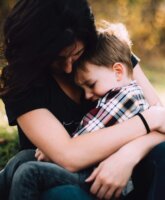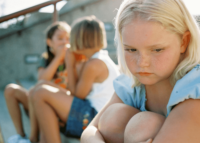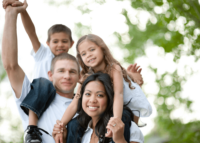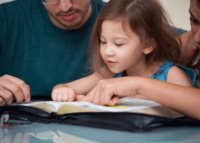Building Bridges Through Forgiveness

It was a pretty spring day, and my children were playing happily in our driveway. They were pushing each other in their Little Tykes Cozy Coupe and giggling with excitement. It was a delightful day in my home.
That is, until my daughter went too far.
My son, who is younger than her by about eighteen months, was clearly apprehensive about going too fast. She couldn’t understand that her brother wanted his feet to keep up with the car. He wanted to feel like he was in control.
I asked her to slow down because I saw the fear creep into his face.
She looked at me, turned her face away, and then pushed her brother with so much force he experienced his first—and hopefully his only–car wreck.
His little body leaned forward, hit the steering wheel, and slid down and out underneath the car. This ultimately led to tears, a few scrapes, and a mama outburst I wasn’t proud of.
Once I picked up my son and assessed the minimal damage, I grabbed my daughter by the arm and dragged her onto the front porch. I put my nose very close to her face and proceeded to reprimand her in a voice the neighbors in the next subdivision could have heard.
She began to look away, grabbed her little face with one hand, and squeezed her cheeks as I screamed, “Don’t look away from me when I’m talking to you!”
She then broke.
Not in the way that she was repentant for what she had done but because she was scared. As self-awareness rose inside me, I let go of her and stomped off to tend to my son’s surface wounds.
What chased me down wasn’t my daughter; it was full force “mom shame.”
I immediately regretted what I had just put her through. I knew it was wrong and hurtful. I should have gone back to her in that moment and asked her to forgive my outburst. But anger won, and pride prevented me from taking that short walk.
I feared I would lose parenting control. I justified it.
After all, she was the one who’d injured her brother in absolute rebellion.
Turning failure into opportunity
Unfortunately, this pattern of rebellion, followed by discipling in anger, has presented itself multiple times. I started to loathe the person I was becoming. I created a life of order, obedience, and a routine that prevented situations where I would have to discipline my children.
On top of constructing a regimented lifestyle, I looked for opportunities to escape from my kids so I wouldn’t have the chance to become the “angry mommy” again. I began filling my life with stuff, classes, and distractions to spend as little time as possible alone with my kids.
This wasn’t healthy.
I needed a better way. I needed help.
I had a mentor mom whom I confided in how I was feeling. (If you don’t have a mentor mom, look for a lady who has older kids you admire and ask her to pray for you, advise you, and help you!)
I explained the desperation and depression I was battling. I felt overwhelmed. I felt guilty. I felt hopeless. I was ashamed.
My friend helped me see that my moments of failure were opportunities to model the beauty of forgiveness to my children. I was missing out on one of the joys of parenting.
She told me it’s simple: when you mess up, ask your kids to forgive you.
She explained that, in the same way I require my children to own up to their disobedience and say sorry, I should do the same. She also reassured me that asking for forgiveness didn’t make me a wishy-washy parent. Contrary to my fear, she promised it would strengthen me and my kids.
You see, I had believed a lie that if I apologized it would somehow undermine my authority in my children’s lives. That I would lose their respect. My kids would become out-of-control brats. This mind-set couldn’t be further from the truth. My willingness to apologize doesn’t pardon their disobedience; it simply takes ownership of my own wrongdoing.
“If we claim to be without sin, we deceive ourselves and the truth is not in us. If we confess our sins, he is faithful and just and will forgive us our sins and purify us from all unrighteousness” (1 John 1:8–9 NIV).
How to model forgiveness with your kids
The next time I failed at showing self-control with my kids, I went to them both and apologized.
My confession was short and authentic. It followed the same steps I expected them to demonstrate when they had disobeyed. It went something like this:
Step one: Own up to what you did and be specific.
“Hey, guys. You know earlier today when you were fighting in the kitchen and mommy lost her temper and I yelled at you?”
Typically, they would nod in agreement.
Step two: State why what you did was wrong.
“I didn’t have self-control. I didn’t show you grace, and I am really sorry.”
Step three: Ask for forgiveness.
“Will you please forgive me?”
Again: nods of agreement, sometimes followed by a sweet hug and the most heart-melting words, “It’s okay, Mommy. We love you.”
After practicing modeling repentance and forgiveness like this a few times, I started to have more self-control. When you have to face anyone and ask for forgiveness, it is hard. Asking your children to forgive you is gut-wrenching.
However, my mentor was right. This pattern began to strengthen me and my relationship with my children.
The amazing thing about showing your kids how to ask for forgiveness is that they then recognize the importance of repentance. God adores a repentant heart.
“Repent, then, and turn to God, so that your sins may be wiped out, that times of refreshing may come from the Lord” (Acts 3:19).
Refreshing follows forgiveness. Modeling asking for forgiveness demonstrates how to find freedom that comes from repentance.
Fast-forward several years, as my children are now ten and eleven years old.
I still get the opportunity to model asking for forgiveness on occasion. My children are hitting those beautiful ages where hormones and the desire to be independent position themselves against my own desire for them to stay young, sweet, and dependent on me. It’s a glorious challenge.
Fortunately, this tween season is one many other parents have already navigated. They have not only gone through it, but they write books, share podcasts, and YouTube “how to’s” about raising tweens. Guess what?
They talk a lot about modeling forgiveness. It is both asking for forgiveness and forgiving. The give and take of grace is godly.
A call to build bridges to freedom
I’m confident that, if we created a habit of repentance and forgiveness, we could change our world. When we model how to ask for forgiveness, we set our children up to do the same. They become aware that they will not always get it right. None of us do. When they mess up, they will have a way out of the guilt, shame, and condemnation that follow a mistake.
We create invisible prisons for our children when we don’t model how to ask for forgiveness. How many of us have carried around unforgiveness toward ourselves and others? Those feelings of bitterness, resentment, and shame construct walls that are unseen but create a prison—just like I had boxed myself into depression and anxiety as a young mom when I lost my temper. These emotions become the invisible chasm between achieving healthy, intimate, and authentic relationships.
When we model repentance and forgiveness, we build a bridge across that chasm. We show the pathway to the freedom Jesus died for us to have.
The next time you lose your cool or say an unkind word to your children, consider how you can use that moment to show humility and ask for forgiveness. Be determined to silence the voice that tells you it is weakness.
Even if it has been years since a hurtful event occurred, be a bridge-builder. As sinful human beings, we stood on one side of the chasm, but Jesus built a bridge to himself on the cross. He set the standard for us.
I promise that being willing to ask for forgiveness will bless you, it will bless your children, and it will bless your community.







